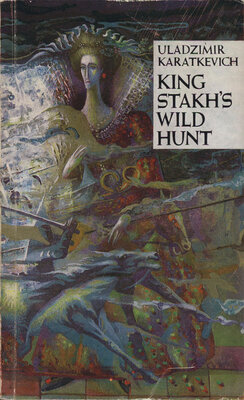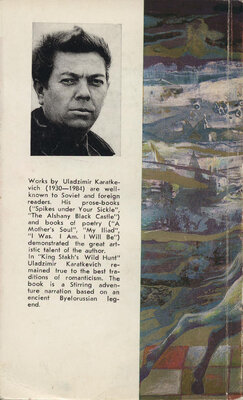King Stakh's Wild Hunt
Уладзімір Караткевіч
Выдавец: Мастацкая літаратура
Памер: 248с.
Мінск 1989
“You mustn’t worry. As far as that goes, I’ve also become interested in this. There’s no place for apparitions in the Steam Age. I swear that the two weeks left for me to spend here, I shall devote to solving this mystery. The d-devil take it, such nonsense! But one thing, you mustn’t be afraid.”
She smiled faintly:
“Oh! Don’t mind me... I’m accustomed to it. It goes on here every night.”
And again the same expression on her face that spoiled it so, and that I couldn’t understand. It was fright, chronic, horrible fright.
Not the fright that makes one’s hair stand on end for a moment, but the fright that finally becomes a habitual state impossible to get rid of even in one’s sleep. This unfortunate girl would have been good-looking, were it not for this constant, terrible fear.
And notwithstanding the fact that I was beside her, she moved up still closer to me to avoid seeing the darkness behind me.
“Oh! Mr. Belaretzky, it’s dreadful. What am I guilty of, why must I answer for the sins of my forefathers? An excessive weight has been laid on the weak shoulders of mine. It’s a clinging weight and a heavy one. If you could know how much blood, and dirt, how many murders, orphans’ tears are on every coat-of-arms of the gentry! How many murdered or frightened to death, how many unfortunates! We haven’t the right to exist, even the most honest of us, the very best of us. The blood in our veins is not blue, it’s dirty blood. Don’t you think that we are all up to the twelfth generation responsible for this and must answer for it, answering with suffering, poverty and death? We were indifferent to the people that suffered tortures side by side with us and from us, we considered the people cattle, we poured out wine, while they shed their blood. They had nothing but bad bread. Mr. Dubatowk, my neighbour, once came to my father and told him an anecdote about a peasant woman who took her son to the priest and the priest treated them to “kuldoons”, those delicious baked potato pancakes stuffed with meat and cheese. The child asked what theywere. The mother with that innate peasant delicacy pushed him with her foot under the table and whispered: “Hush!” The child ate up what was on his plate, then sighed and said quietly:
“And I’ve eaten a dozen of these hushes.” Everybody who heard this anecdote laughed, but I was ready to slap Dubatowk in the face. There’s nothing funny in the fact that children have never seen “kuldoons”, have never eaten any meat. Their hair is thin, their legs are crooked, at the age of fourteen they are still children, but at twenty-five they are ancient, their faces wrinkled and old. No matter how you feed them, they give birth to the same kind of children, if they do, at all, have any. They answered us with rebellions, savage rebellions, because they suffered unheard-of wrongs. And then we had them executed. This one here on the wall, with a beaver collar, tortured his cousin to death because he had deserted to the detachment of Vasil Vashchyla, the leader of the 1740 rebellion.
“His cousin’s name was Aghei GrynkevichYanowsky. How indifferent we were to everybody and everything. The same two-footed people as we are, they lived on grass, although our land is generous and bountiful. We bartered our land, sold it to greedy neighbours, to anybody who wanted it, while the peasants loved the land like their own mother, and starved for a lack of bread. And who will blame them when they take up their pitchforks and thrust them into our chests? It seems to me that even after 100 years when we have all died out, if the descendants of these unfortunates accidentally find one of the gentry — they will have the right to kill him. The earth is not for us.”
I looked at her in astonishment. This vehement inspired outburst made her face look unusual. And I suddenly understood she was not at all ugly, not at all! Here before me was an unusual girl, surprisingly beautiful, with a mixture of madness and beauty. Gracious me! What
beauty it was!!! In all probability such were our ancient “prophetesses” who fought in the detachments of Murashka and the Peasant Christ, the leaders of the rebellions around Minsk and in Prineman in the 17th century. It was an unearthly beauty, a tormented face with bitter lips and enormous dry eyes.
And suddenly it all disappeared. Again here in front of me was sitting the previous creature, puny and starved. But now I knew her true worth.
“Even so, I do not want to die, not at all. How I wish to see the sun, the meadows, so different from those I know, and to hear childish laughter. My desire for life is great, although I haven’t the right to live. It is only the dream of life that has given me the strength to endure the experiences of the last two years, even though there is no way out for me. These steps that we have here at night, the Little Man, the Lady-in-Blue. I know that I shall die. And this is King Stakh’s doing. If not for this Wild Hunt of his — we should probably yet live. The Hunt will kill us.”
If previously I had been almost entirely indifferent to this emaciated child of the gentry, after her passionate outburst I understood that some miracle had occurred and changed her into a real person. I felt it necessary to help her.
And thus, lying with my eyes open in the darkness of the night, I thought almost till the very morning, that if yet yesterday I had decided to leave this abominable place and this high-born hostess of mine within two days, I should now remain here a week, two weeks, a month, to find the answer to all these secrets and return to this person the peace she deserves.
CHAPTER THE THIRD
The first; thing that I did the following day was to break down the board from the door that was fastened with nails and in which the Little Man, if he were a being of flesh and blood, could have hidden himself. The nails were rusty, panels on the door were whole and a layer of dust three fingers deep covered the room. No one could have hidden himself there and I nailed the door up again. Then I examined all rooms in the other wing and was convinced that no one could have hidden himself there cither. Above the corridor where I had heard steps, there was an attic in which there were no traces of any footsteps either. To the right there was a door into my room and the room of the mistress of the house, behind which there was a blank wall and behind that the park.
My head was in a whirl from all this. Could it possibly be that something supernatural really existed in the world? I, a confirmed atheist, could never accept that.
I decided to go to the library and find out finally whatever this Wild Hunt was, about which it was inconvenient for me to question the mistress of the house. Incidentally, I had hopes of finding some old plan of the house there, and to be able afterwards to begin making a methodical search. I knew sometimes special mechanisms were built into the walls of old castles, so-called “listeners-in”, that is, secret gaps. In them “voices” — speciallyshaped pitchers— were usually bricked up to amplify sounds. Thanks to them, the master of the house being at one end of the house, could distinctly hear what his guests or servants were saying at the other end.
Perhaps something of the kind was to be found here, too. Some servant or other walked about at night on the ground floor, and his steps resounded up above. It was a faint hope, but truth is sometimes stranger than fiction.
And I made my way to the library which was between the ground and first floors in a separate wing.
Seldom had I seen such neglected rooms. The parquet was broken here and there, the enormous windows were covered with dust, the chandeliers hanging from the ceilings were in dusty covers. This was, perhaps, the most ancient part of the house, around which the castle later arose. This thought struck me when I saw a strange room just in front of the library. And here, too, there was a fireplace, but such an enormous one, that an aurochs could have been roasted in it, and nests for the spits even remained in its walls. The windows were small, made of stained glass, the walls were crudely plastered, the ceiling was crossed by heavy, square, carved beams covered with smoke. And on the walls hung crude old weapons.
In a word, this was a room of “the good old times’’ when the masters of the house (the Polish landowners) together with their serfs gathered together in one room and sat beside the fire. The women of the household and the servants spun, the master played dice or the game “Twelve Fingers” with the boys. Oh! Those idyllic old times!
Forgive me, my dear readers, that I cannot omit describing even a single room. It can’t be helped, in his old age a man becomes garrulous. And in addition, you have never seen and never will see anything the like of this, and perhaps it will be interesting to somebody.
The library was in the same style as the entrance hall. High arches, columned windows, armchairs covered with leather now turned brown with age, enormous closets of morain oak and books, books, and books.
Well, how can I pass them by without saying at least a few words! My heart stops beating at these memories. Ancient parchment books, books made of the first porous paper, books in which the paper had become yellow with time, paper smooth and glossy. Books of the 17th century which you can immediately recognize by their leather bindings. The red leather of the bindings of the 18th century; the wooden boards, bound with thin black leather, that covered the books of the 16th century.
And the titles, my God, what titles: “The Royal Roussian Catechism”, “An Authentic Chronicle of the Life of Yan Zborowsky”, “Varlaam the Indian”, “A Parable about Fame”, old “Six-Day” manuscripts,* collections of ancient legends, “Gesta Romanorum” consisting of 200 stories, “Trishchan and Izota”, the Byelorussian variant of “Bova”, “Apephegma”, “Speech of Myaleshka”. A treasure-house! And there were newer books written in a mannered style, with long titles, such as “Cupid Contrives, or One Thousand Ways and Means an Adoring Lover Can Apply to Make His Beloved Consent to Love’s Greed”.
 КНІГІ ОНЛАЙН
КНІГІ ОНЛАЙН


